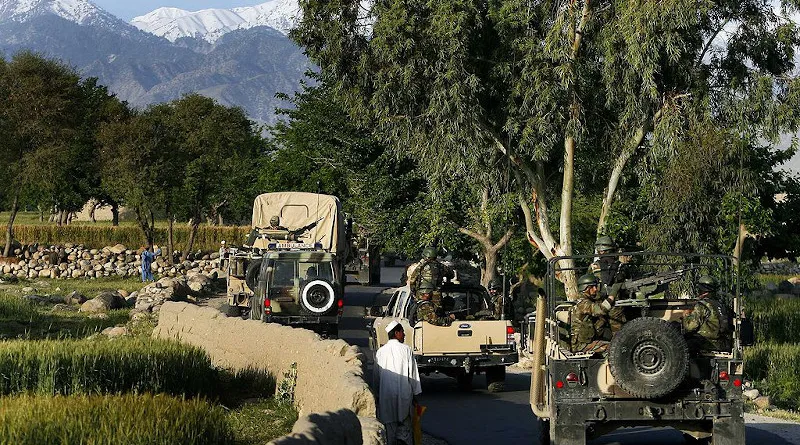Afghanistan Conundrum And India-ISKP Nexus – OpEd

Islamic State Khorasan Province (ISKP) was established in 2014 at the height of Islamic State activities in Iraq and Syria. The Khorasan region includes areas of current Pakistan and Afghanistan. The aim behind establishing the terrorist organization was the formation of Islamic Caliphate in the region. For the purpose, any external factor either it’s the presence of foreign forces in Afghanistan or soft influence of the west are considered threat by ISKP. It is one of the most extremist and brutal organization in Afghanistan that has carried out attacks in not just Afghanistan but also against the neighboring countries especially Pakistan and Central Asian states.
Carrying out massive operational propaganda, ISKP attracts fighters from Pakistan and India. The major attraction behind the recruitment is its extremism. Fighters form Tehreek Taliban Afghanistan (TTA) join the organization because former remains moderate towards the western narratives. ISKP is not just fighting against the foreign influence but also against the Taliban because of their moderate approach in signing a peace deal.
After the withdrawal of US troops from Afghanistan, the existence of the organization with its brutal agenda brings many challenges for Afghan Taliban as well as for regional peace and security. Attacks against Pakistan has been increased. Pointedly, ISKP does not carry out any attack against Indians. Rather the major target is Pakistan and to destabilize the region. Reports have anticipated Indian links with Al-Qaeda as well as with the ISKP to malign stability in Pakistan-Afghanistan relations. In September, the Caliphate fighters attacked Pakistani Charge d’Affairs, Ubaid-ur-Rehman Nizami in Kabul. He was attacked while walking inside the compound. Although the assassination attempt failed, but the bodyguards became injured. ISKP later claimed responsibility of the attack saying the ‘Khalifa Soldiers’ shot them with the medium range weapon and sniper rifles. Days after attacking the Pakistani representative, Al-Azaim foundation for Media Production of ISKP released a video in English threatening Pakistan government. The 18 minutes video was titles as ‘To the Muslims in the land of Muhammad bin Qasim.” It was attractive as the video was first ever English language video focused primarily on Pakistan. This is no secret that India had been trying to hurt CPEC projects through its proxies in Pakistan’s Balochistan. ISKP also looks enviously towards the project as it will enhance the foreign influence in the region to them. The organization also targets Central Asian states like Uzbekistan, Tajikistan and Turkmenistan as calling them the salves of Russia. The video in the end asked the Muslims in Pakistan to join the ISKP and stand against the government.
As the ISKP plays its role in destabilizing relation between Afghanistan and its neighbors especially Pakistan, Indian media is very active in highlighting this downward trend. Since 2014, Indian government has been trying to establish contacts with the ISKP and Al-Qaeda against Pakistan. International media reported in the year that National Security Advisor, Ajit Doval had met the Al Qaeda and ISKP, in Iraq to use the groups against Pakistan. In 2020, a United Nations report on terrorism affirmed significant numbers of ISKP terrorists in two Indian state Kerala and Karnataka. Abd ur Rehman Logari, the terrorist who carried out attacks on American forces at Kabul airport, killing 170 including 13 US Marines had links with India. He spent at least one year in Indian cities before coming to Afghanistan for the attack. Another ISKP terrorist Abu Khalid al-Hindi also belonged to Indian Malayalam community of Kasaragod attacked on a Sikh Gurdwara Har Rai Sahib in Kabul. So, this is not hidden that India had been a safe heaven for ISKP militants and seeks support from its intelligence agencies.
Right after the inception of both countries, Pakistan and India, they have tried to establish their influence in Afghanistan for the sake of strategic depth. Avinash Paliwal, an Indian writer has highlighted Indian role in the country to instigate instability in Pakistan. There were several Indian consulates linked with Indian embassy to enhance its influence in the country. As the Taliban struggle with establishing a strong control inside and good relations with the neighboring states, India has proven to be the biggest spoiler of the region. India would never want that Afghan Taliban would come in good relations with Pakistan as it will lessen Indian influence and bring peace in the region. For the sake of regional stability, countries must come up jointly to counter Indian-ISKP nexus.
